While a classical and an acoustic guitar both visually look similar — with a construction including six-strings tuned EADGBE, a soundhole, and tuning pegs — many of these similarities function differently. Before you dive into playing or purchasing a classical guitar, let’s go through a few key differences you should keep in mind.
Body
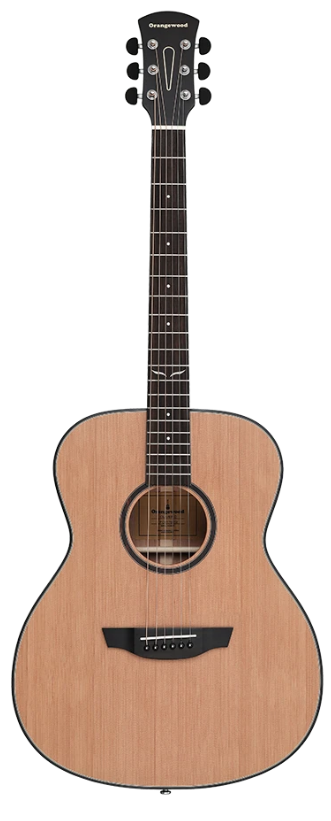
Acoustic Guitar 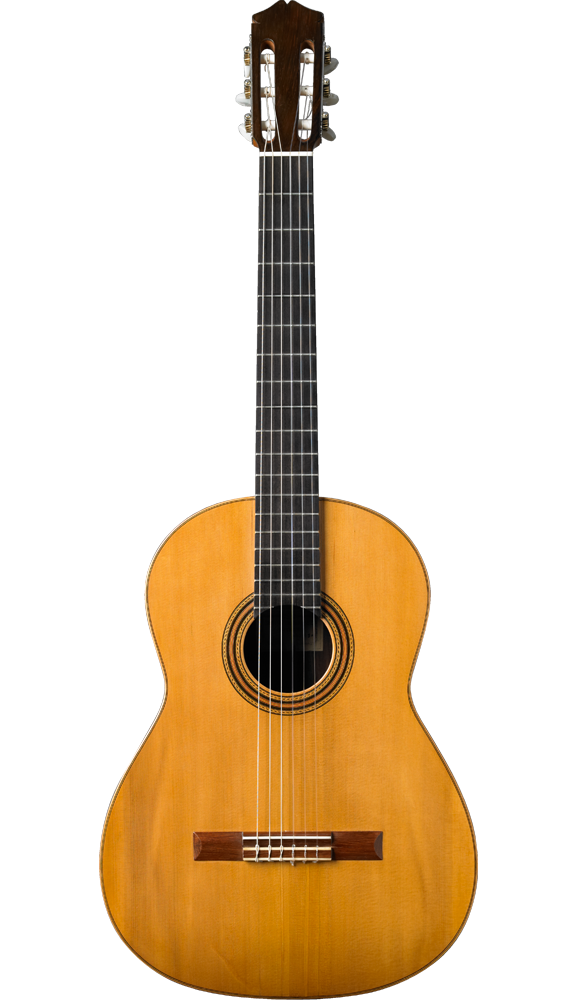
Classical Guitar
Shape
Most acoustic guitars come in a dreadnought shape in a standard parlor size. Parlor size guitars are typically smaller than a classical guitar, but some are larger depending on the type of acoustic guitar manufacturer.
Neck
Typically, a standard classical guitar has a wider neck than an acoustic guitar. Remember that an acoustic guitar is meant for strumming or fingerpicking; therefore, the smaller neck widths and shorter string spacing make these techniques easier for players. It’s also best to keep in mind that classical guitars tend to not have fret markers, which may or may not pose a challenge to players.
Bridge
A classic wrap-around bridge is used on a standard classical guitar. On this type of guitar, the strings are tied in a knot around the bridge to secure them in place, similar to a ukulele. But classical bridges also accept ball-end classical strings, which is the preferred string method for these types of rigs. In contrast, the bridge on an acoustic guitar has pegs that securely hold the strings in place.
Strings
The ultimate difference between an acoustic and a classical guitar is the strings. Classical guitars use nylon strings as opposed to steel strings on an acoustic guitar.
This is where the major differences in sound come from. Nylon strings are a lot thicker and produce a more mellow, softer sound than steel strings. The treble strings (G, B, high E) are made with nylon monofilament while the bass strings (E, A, D) feature a silver-plated copper wrapped around a nylon multifilament core. Nylon strings are softer to the touch and have a plastic feel, which makes them ideal for beginners.
While the nylon strings might be easier to play for uncalloused hands, the sound is not as common in modern music. If you like Spanish, Flamenco, or classical music, this type of sound can be achieved with a classical guitar. But most modern rock, folk, blues, and country performers use an acoustic guitar.
The steel strings on an acoustic guitar produce a bright, crisp, even twangy sound that resonates more than a classical guitar. Acoustic guitar strings are manufactured in a variety of metals and materials, including nickel and bronze. These strings are thinner, making them extremely similar to electric guitar strings while also being somewhat sharper on the fingers.
Types of Strings
Classical
Ernie Ball offers a variety of both classical and acoustic guitar strings. Explore our different offerings below to find which set is best for your sound and playing style.
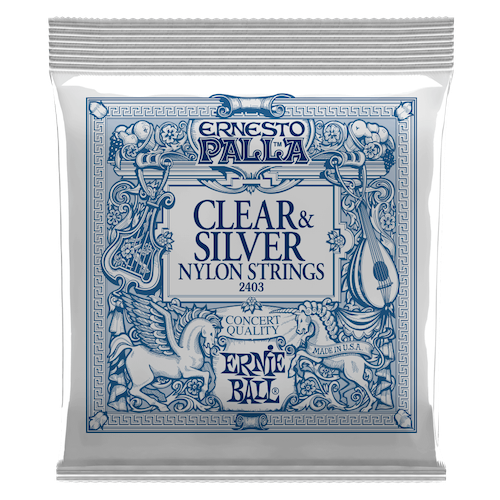
Ernesto Palla Clear & Silver Nylon Strings Classical Guitar Strings
Clear & silver nylon strings are our most popular classical strings. These concert quality strings produce a smooth, rich tone with excellent clarity and performance.
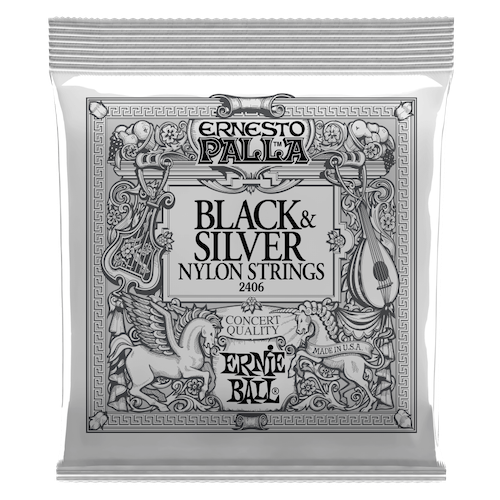
Ernesto Palla Black & Silver Nylon Classical Guitar Strings
Made from a different material composition, black nylon strings produce a warm, pure sound with more treble overtones. Black nylon strings are most popular among folk guitarists.
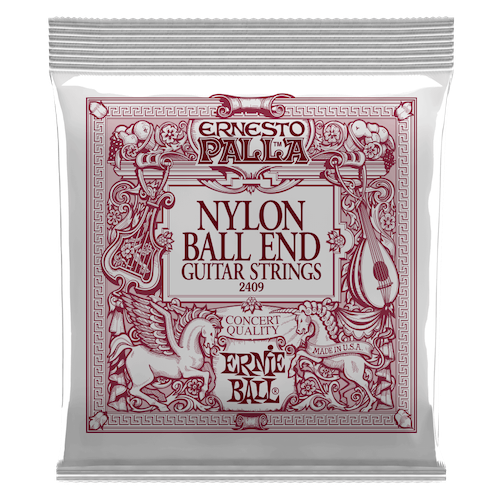
Ernesto Palla Black & Gold Ball-End Nylon Classical Guitar Strings
Gold wound basses are made of 80/20 bronze wrapped around a nylon multifilament core providing a smooth, rich tone. These strings feature ball end construction for faster, easier installation over traditional tie-end strings.
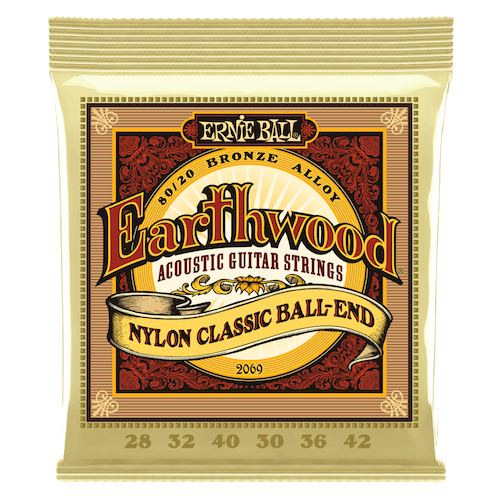
Earthwood Folk Nylon, Clear & Gold Ball End, 80/20 Bronze Acoustic Guitar Strings
Ernie Ball Folk Nylon acoustic guitar plain strings are made of a solid nylon clear filament. Nylon produces rich pure treble tones with percussive attack. Ernie Ball folk nylon wound strings are made of 80/20 bronze wrapped around a multifilament nylon core.
Acoustic
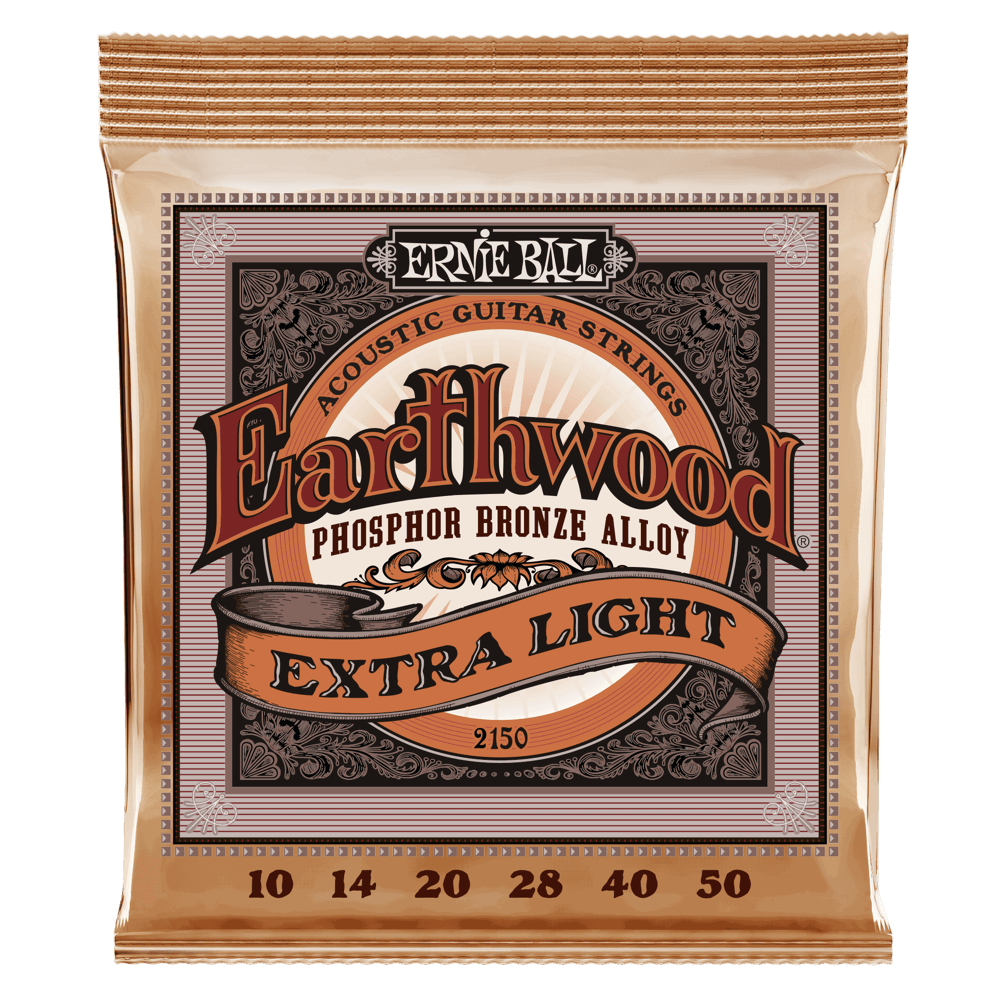
Earthwood Acoustic Guitar Strings
Our Earthwood acoustic guitar strings are available in our Phosphor Bronze for a mellow, ringing sound while our 80/20 Bronze produces crisp, pleasing overtones.
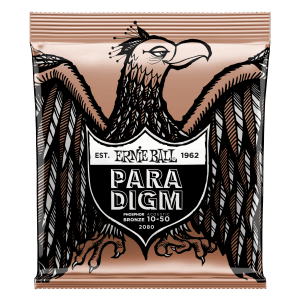
Paradigm Acoustic Guitar Strings
Our Paradigm acoustic guitar strings are available in both our 80/20 and Phosphor Bronze. These strings provide unprecedented strength and longer string life while retaining 100% Earthwood tone and feel.
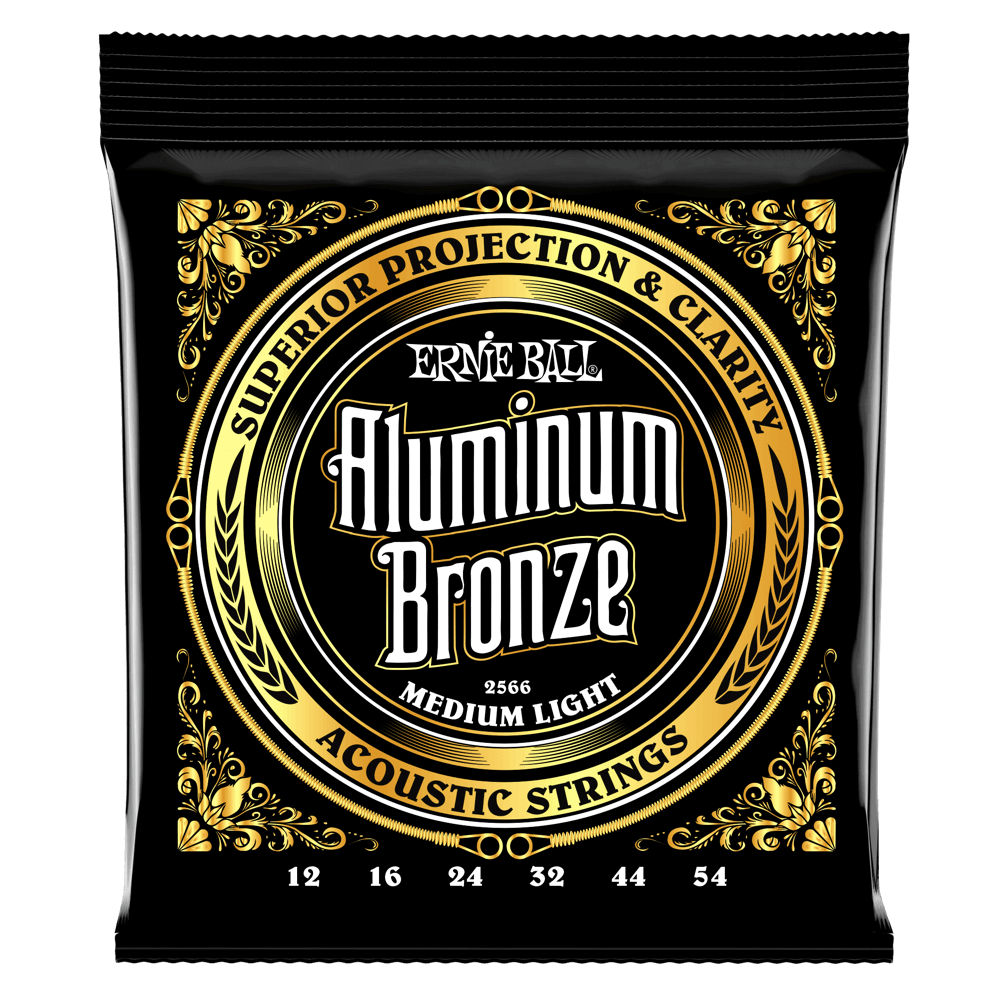
Aluminum Bronze Acoustic Guitar Strings
Ernie Ball Aluminum Bronze Acoustic Guitar Strings feature more projection and clarity than traditional bronze strings, while also providing improved corrosion resistance. Aluminum Bronze Acoustic strings are made with Ernie Ball Maraging Steel hex cores and Aluminum Bronze wrap wire which provides more pronounced lows coupled with crisp brilliant highs. Made from a blend of copper and aluminum specifically tailored for acoustic guitar strings.
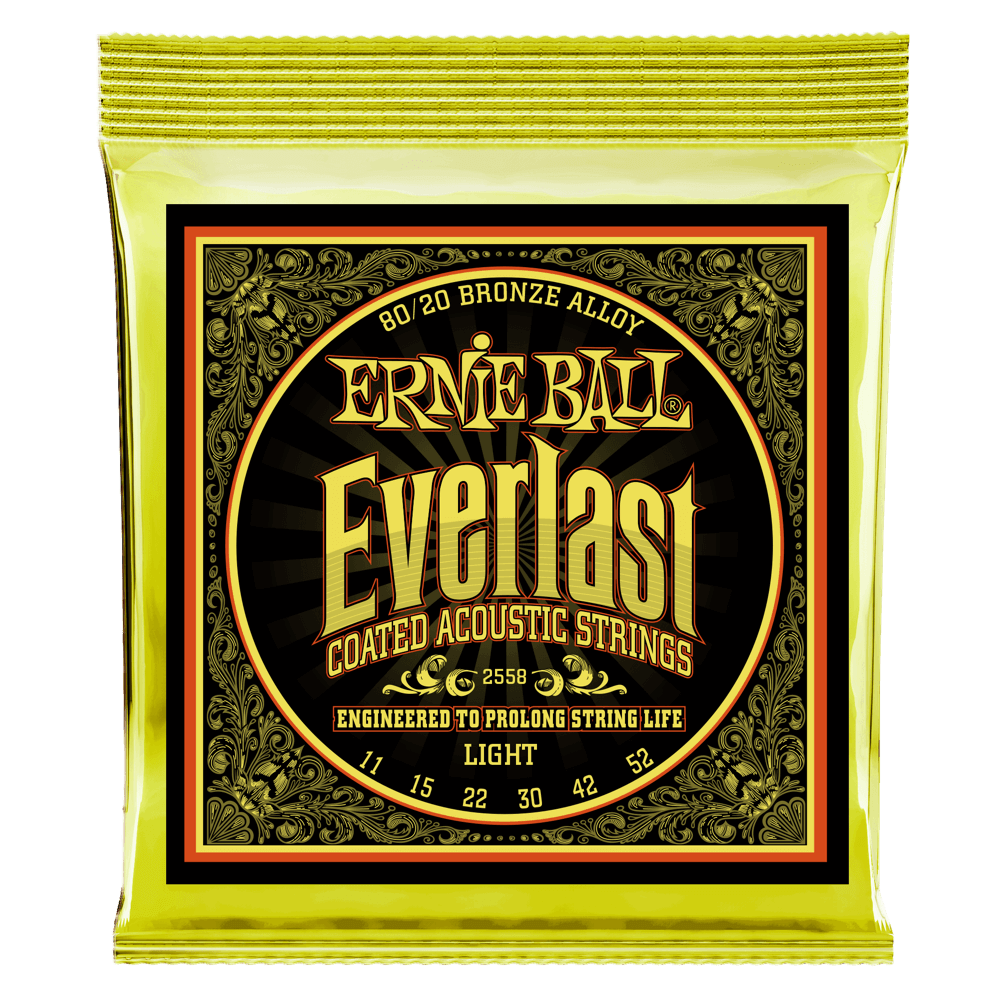
Everlast Coated Acoustic Strings
Our Everlast acoustic strings are available in both our 80/20 and Phosphor Bronze. Ernie Ball Everlast Coated acoustic guitar strings use groundbreaking nanotechnology that repels unwanted moisture and oils that negatively impact your tone. Our proprietary treatment is applied to both the inner hex core and outer wrap wire to provide ultimate protection without compromising tone or feel.
Want to see our classical guitar strings in action? Check out Steve Morse playing Ernie Ball Ernesto Palla Clear & Silver Nylon Classical Guitar Strings.


